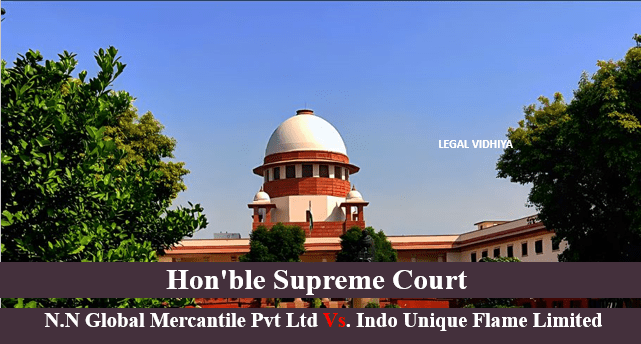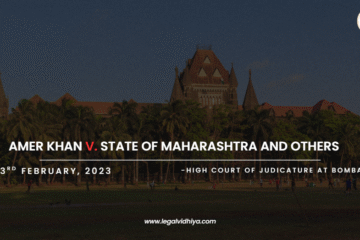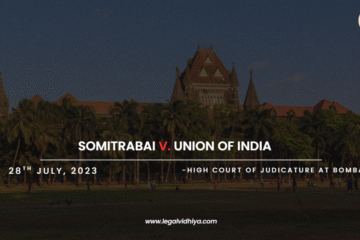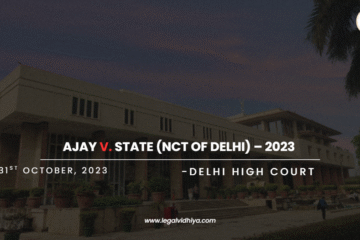
| Citation | (2023) SSC Online SC 495 |
| Appellant | M/S. N.N. Global Mercantile |
| Respondent | M/S. Indo Unique Flame |
| Bench | Justice KM Joseph, Aniruddha Bose, CT Ravikumar, Ajay Rastogi, and Hrishikesh Roy |
| Court | Supreme Court of India |
| Case types | Civil Appeal |
| Date of Judgment | 25 April 2023 |
FACT OF THE CASE:-
Respondent ordered Karnataka Power Corporation Ltd. (KPCL) to wash coal on 18 September 2015 for this work respondent presented a Bank guarantee of Rs. 29.25 crore to KPCL through SBI. After this, the respondent entered into a sub-contract with the appellant to transport the coal from one place to another place, which was ordered to carry out the transportation work on 28 September 2015. Clause 9 of this sub-contract given in provided that a security deposit would be given which the security amount given by the appellant would be issued from a Nationalized First Class bank and this security amount would be valid for 18 months and as per Clause 10 of the sub-contract, if any dispute arises under this sub-contract, an arbitration agreement will be included for resolution. As per clause 9, the appellant respondent has presented a bank guarantee of Rs. 3,36,00,000 in the favour of SBI banker on 30 September 2015. This bank guarantee was extended from time to time and finally, the bank guarantee was extended on 10 November 2017. On 18 September 2015, a dispute arose between KPCL and the respondent due to which the bank guarantee had to be invoked by KPCL on 6 December 2017. Apart from this respondent used a work order dated 7 December 2017 due to the invocation of this sub-contract appellant filed case number 62 in Nagpur Commercial Court against the respondent and its banker SBI and its banker in 2017.
Said that there was no such loss under the work from which the bank guarantee could be enforced. Respondent opposed Section 8 of the Arbitration and Conciliation Act 1996 in 2017. The appellant opposed this Section 8 appeal to the Commercial Court on 18 January 2018 and rejected Section 8.
Respondent filed a writ petition in the Mumbai High Court under Articles 226 and 227 to challenge this decision. The High Court quashed the Commercial Court decision and the High Court said that the application was under Section 8 of the Arbitration and Conciliation Act 1996. Allowing it to be maintained that there was a valid arbitration agreement between the parties and the alleged bank guarantee fraud invocation can not be resolved by arbitration, the High Court also further held that the arbitration agreement was because the work order was not stamped. Under Section 11 of the Arbitration Act, the arbitral tribunal can be deemed to be void. This decision of the appellant High Court has been filed for a Special Leave in the Supreme Court.
ISSUE OF THE CASE:-
Whether there be an arbitration dispute on the allegation of fraudulent invocation of bank guarantee?
Whether arbitration proceedings be initiated in a sub-contract that is not stamped?
Appellant’s Argument:-
NN Global Mercantile Pvt. Ltd. (NN Global) argued that the arbitration agreement in the case was enforceable, even though the underlying contract was unstamped. NN Global relied on the doctrine of separability, which holds that an arbitration agreement is a separate and distinct agreement from the underlying contract. NN Global argued that the doctrine of separability should apply to unstamped instruments, as it is a fundamental principle of arbitration law.
NN Global also argued that the public policy considerations underlying the Stamp Act are not relevant in the context of arbitration. NN Global argued that arbitration is a private dispute resolution mechanism and that the parties should be free to agree to arbitrate their disputes, even if the underlying contract is unstamped.
Defendant’s Argument:-
Indo Unique Flame Ltd. (Indo Unique Flame) argued that the arbitration agreement in the case was unenforceable because the underlying contract was unstamped. Indo Unique Flame relied on the principle that a special law overrides a general law. Indo Unique Flame argued that the Stamp Act is a special law that overrides the general law of contract. Indo Unique Flame also argued that the public policy considerations underlying the Stamp Act outweigh the policy considerations underlying the doctrine of separability. Indo Unique Flame argued that the Stamp Act is designed to raise revenue for the government and to prevent fraud. Indo Unique Flame argued that the doctrine of separability should not be used to undermine the public policy objectives of the Stamp Act.
JUDGEMENT OF THIS CASE:-
Two judge bench of the Supreme Court transferred this case to the three-judge bench and transferred this case to the Five bench. While transferring, the bench of three judges gave its reasoning that:-
The arbitration clause would be severable from the original sub-contract and is based on the doctrine of Separability and Kompetenz- Kompetenz and further that even if the main contract was not stamped the arbitration clause would still be enforceable. There is a provision in the Stamp Act of 1899 that an unstamped contract is voidable it can not be said that a contract without a stamp is inadequate in the eyes of the law.
The Bench of Five Judges gave the verdict by a 3:2 majority and held that the arbitration agreement without venue sub-contract is not valid and enforceable in legal terms.
Justice KM Joseph, Aniruddha Bose, and CT Ravikumar in a majority of 3:2, while giving the verdict said that the provision in the Arbitration and Conciliation Act 1996 without a stamped arbitration agreement can not be implemented by the Stamp Act of 1899.
While Justice Ajay Rastogi and Hrishikesh Roy gave different views. Both said that stamp-free contracts are a reform issue. It should not be invalidated in law and further states that any dispute arising out of the agreement should be settled by the Arbitral Tribunal by the Arbitration Act.
While giving the decision the Supreme Court mentioned many more cases, out of which Garware Wall Ropers Ltd. vs. Coastal Marine Constructions was mentioned in this case, the decision said that a compromise should be implemented to correct the defect of stamp duty. Further. The Supreme Court cited the Vidya Drolia vs. Durga Trading Corporation according to Section 11 the court should intervene in this only when there is full knowledge that the arbitration agreement is invalid. The disputes should be properly considered at the time of mediation. Apart from the Supreme Court mentioning the SMS Tea Estates Ltd. vs. Chandmari Tea CO. Ltd. Case it was said that stamp duty could not be used as evidence of an agreement he could not be trusted.
The Supreme Court agreed with the majority opinion in this case and said that without a stamp the arbitration agreement will not be legally valid.
CONCLUSION:–
Previous case decisions in the NN Global case were also overturned and the position of the SMS Tea case and Garware Wall Ropers case was upheld. This case determined that a contract which is not stamped. It will not be considered a valid contract in legal terms. This decision can remove all the misconceptions related to arbitration fraud in India. Now only the time to come will tell how this decision affects the arbitration process in India and how it will be implemented in practice may apply.
REFERENCE:-
- https://www.mondaq.com
- www.scconline.com
- https://indianlawlive.net
- https://www.legalserviceindia.com
- https://www.khaitanco.com
- https://www.barandbench.com
ABOUT THE AUTHOR:-
This article is written by Dhiraj Kumar Saw, student of University Law College Hazaribagh, (VBU) Jharkhand. Intern at Legal Vidhiya.




0 Comments